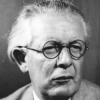Jean Piaget

Jean Piaget
Jean Piagetwas a Swiss clinical psychologist known for his pioneering work in child development. Piaget's theory of cognitive development and epistemological view are together called "genetic epistemology"...
NationalitySwiss
ProfessionScientist
Date of Birth9 August 1896
CityNeuchatel, Switzerland
CountrySwitzerland
psychology epistemology absolutes
In genetic epistemology, as in developmental psychology, too, there is never an absolute beginning.
reality would-be impossible
Accommodation of mental structures to reality implies the existence of assimilatory schemata apart from which any structure would be impossible.
past moments currents
The current state of knowledge is a moment in history, changing just as rapidly as the state of knowledge in the past has ever changed and, in many instances, more rapidly.
thinking ideas way
To express the same idea in still another way, I think that human knowledge is essentially active.
acquisition accommodations assimilation
Every acquisition of accommodation becomes material for assimilation, but assimilation always resists new accommodations.
roots next-level levels
What the genetic epistemology proposes is discovering the roots of the different varieties of knowledge, since its elementary forms, following to the next levels, including also the scientific knowledge.
firsts tasks logic
If logic itself is created rather than being inborn, it follows that the first task of education is to form reasoning.
order two geometric
As you know, Bergson pointed out that there is no such thing as disorder but rather two sorts of order, geometric and living.
intelligent discovery play
Chance... in the accommodation peculiar to sensorimotor intelligence, plays the same role as in scientific discovery. It is only useful to the genius and its revelations remain meaningless to the unskilled.
religious mean animal
For the fundamental fact of human psychology is that society, instead of remaining almost entirely inside the individual organism as in the case of animals prompted by their instincts, becomes crystallized almost entirely outside the individuals. In other words, social rules, as Durkheim has so powerfully shown, whether they be linguistic, moral, religious, or legal, etc., cannot be constituted, transmitted or preserved by means of an internal biological heredity, but only through the external pressure exercised by individuals upon each other.
writing thinking
I could not think without writing.
one-day next evolution
Scientific knowledge is in perpetual evolution; it finds itself changed from one day to the next.
thinking needs cooperation
The need to speak the truth and even to seek it for oneself is only conceivable in so far as the individual thinks and acts as one of a society, and not of any society (for it is just the constraining relations between superior and inferior that often drive the latter to prevarication) but of a society founded on reciprocity and mutual respect, and therefore on cooperation.
self world contact
In other words, knowledge of the external world begins with an immediate utilisation of things, whereas knowledge of self is stopped by this purely practical and utilitarian contact.